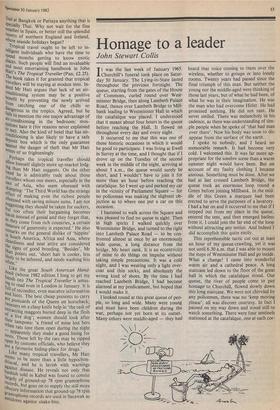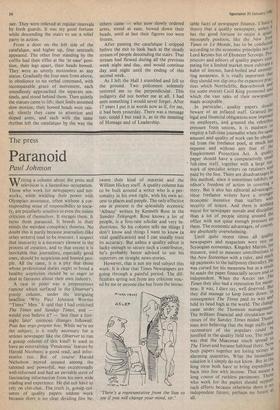Homage to a leader
John Stewart Collis
It was the last week of January 1965. Churchill's funeral took place on Satur- day 30 January. The Lying-in-State lasted throughout the previous fortnight. The queue, starting from the gates of the House of Commons, curled round over West- minster Bridge, then along Lambeth Palace Road, thence over Lambeth Bridge to Mill- bank leading to Westminster Hall in which the catafalque was placed. I understood that it meant about four hours in the queue before reaching the Hall. It flowed on throughout every day and every night.
It occurred to me that this was one of those historic occasions in which it would be good to participate. I was living at Ewell in Surrey at the time, and I thought that if I drove up on the Tuesday of the second week in the middle of the night, arriving at about 3 a.m., the queue would surely be short, and I wouldn't have to join it for more than an hour before reaching the catafalque. So I went up and parked my car in the vicinity of Parliament Square — for no policeman was making the slightest ob- jection as to where one put a car on this occasion.
I hastened to walk across the Square and was pleased to find no queue in sight. Then in high spirits I walked quickly over Westminster Bridge, and turned to the right into Lambeth Palace Road — to be con- fronted almost at once by an enormously wide queue, a long distance from the bridge. My heart sank. It is an eccentricity of mine to do things on impulse without taking simple precautions. It was a cold night, and I was wearing only a light over- coat and thin socks, and absolutely the wrong kind of shoes. By the time I had reached Lambeth Bridge, I had become alarmed at my predicament, but hoped that I would make it.
I looked round at this great queue of peo- ple, so long and wide. Many were young and must have been children during the war, perhaps not yet born at its outset. Many others were middle-aged — they had heard that voice coming to them over the wireless, whether to groups or into lonely rooms. Twenty years had passed since the final triumph of this man. But neither the young nor the middle-aged were thinking of those last years, but of what he had been, of what he was in their imagination. He was the man who had overcome Hitler. He had promised nothing. He did not rant. He never smiled. There was melancholy in his cadence, as there was understanding of sim- ple people when he spoke of 'that bad man over there'. Now his body was soon to dis- appear from the surface of the earth.
I spoke to nobody, and I heard no memorable remark. It had become very cold. I welcomed this. It was far more ap- propriate for the sombre scene than a warm summer night would have been. But on account of my faulty clothing I became anxious. Something must be done. After we had at last crossed Lambeth Bridge, the queue took an enormous loop round a Green before joining Millbank. In the mid- dle of this Green a marquee had been erected to serve the purposes of a lavatory. I had a hat on and it occurred to me that if stepped out from my place in the queue, entered the tent, and then emerged hatless from it, I could join the far end of the loop without attracting any notice. And indeed I did accomplish this quite easily.
This reprehensible tactic cut out at least an hour of my queue-crawling, yet it was not until 6.30 a.m. that I was able to mount the steps of Westminster Hall and go inside. What a change! I came into wonderful warm air and a cathedral peace. A long staircase led down to the floor of the great hall in which the catafalque stood. Our queue, the river of people come to pay homage, to Churchill, flowed slowly down this long staircase. We were not chivvied by any policemen, there was no 'keep moving please', all was discreet courtesy. In fact I paused on my way down and stood still to watch something. There were four sentinels stationed at the catafalque, one at each cor-
ner. They were relieved at regular intervals by fresh guards. It was my good fortune while descending the stairs to see a relief party in action.
From a door on the left side of the catafalque, and higher up, four sentinels appeared. The other four standing by the coffin had their rifles at the 'at ease° posi- tion, their legs apart, their heads bowed. They were as utterly motionless as any statue. Gradually the four men from above, in obedience to no verbal command, with incomparable grace of movement, each soundlessly approached the separate sen- tinels, and stood behind them. Then quietly the statues came to life; their limbs assumed slow motion; their bowed heads were rais- ed: silently they came to attention and sloped arms, and each with the same rhythm left the catafalque by the way the others came — who now slowly ordered arms, stood at ease, bowed down their heads, until at last their figures too were frozen.
After passing the catafalque I stopped before the exit to look back at the steady stream of people descending the stairs. That stream had flcwed during all the previous week night and day, and would continue day and night until the ending of this second week.
As I left the Hall I stumbled and fell to the ground. Two policemen solemnly restored me to the perpendicular. This indignity did not bother me at all. I had seen something I would never forget. After 17 years I put it in words now as if, for me, it had been yesterday. There was a message too, could I but read it, as to the meaning of Homage and of Leadership.



































 Previous page
Previous page